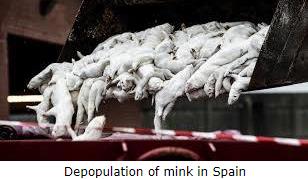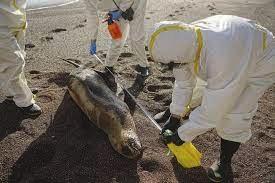 The USDA has added ten new cases of H5N1 avian influenza infection of mammals in four states involving five species. To date, 131 cases have been reported in both terrestrial and marine mammals. Species that are susceptible include black bears, red foxes, mountain lions, bobcats, raccoons, otters, mink and skunks.
The USDA has added ten new cases of H5N1 avian influenza infection of mammals in four states involving five species. To date, 131 cases have been reported in both terrestrial and marine mammals. Species that are susceptible include black bears, red foxes, mountain lions, bobcats, raccoons, otters, mink and skunks.

According to an epidemiologist at the University of Minnesota Center for Infectious Disease Research and Policy, "the Eurasian H5N1 clade currently affecting wild birds and poultry on five continents has a mutation that makes it more recognizable to mammalian airway cells including humans".